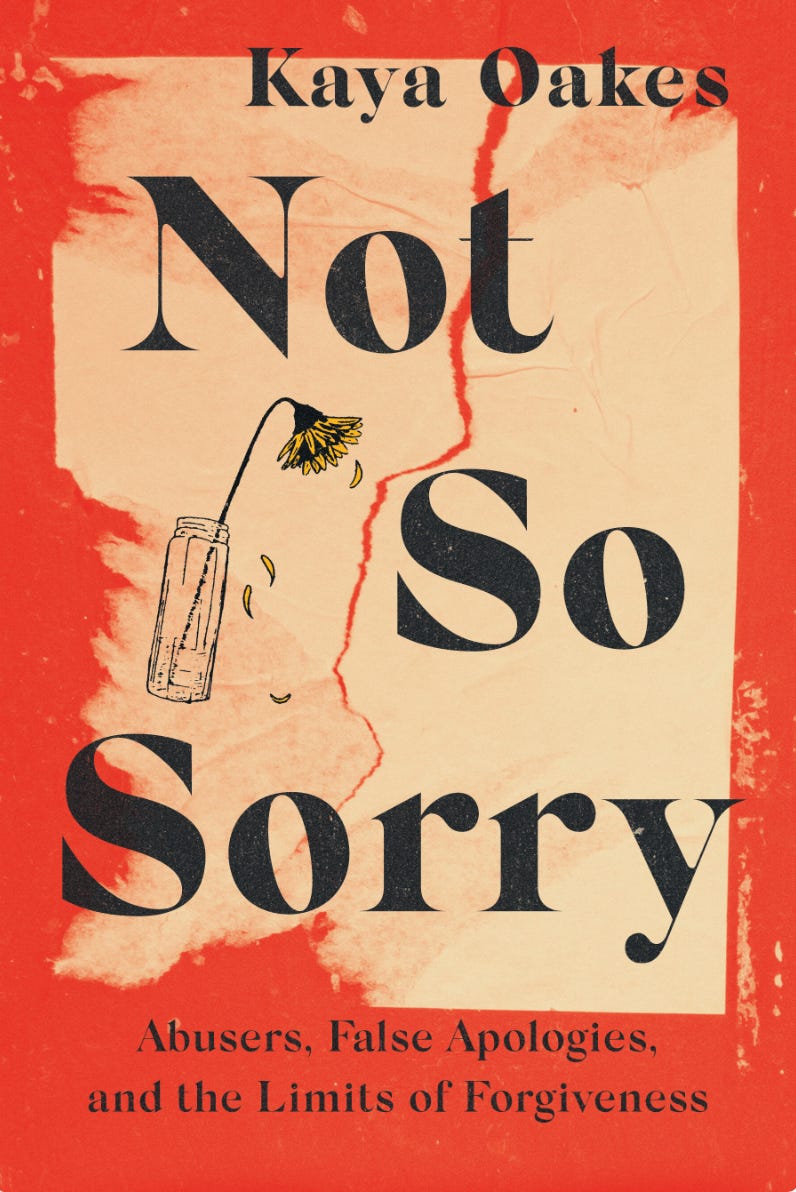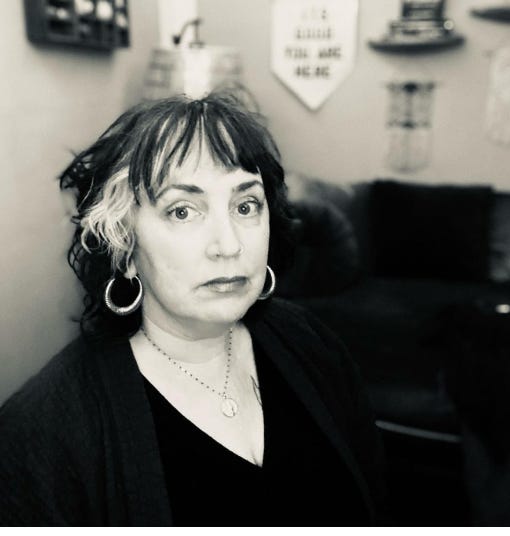It's time for a nuanced discussion about forgiveness.
This is the impetus for Kaya Oakes’s new book, Not So Sorry. I got to know Kaya (virtually) several years back, as we were part of an online writing group. Since that time, she’s written to (maybe three?) books, and her life has taken several twists and turns.
Her new book is on forgiveness. And not forgiving. And what justice looks like in the aftermath of abuse. Here’s the synopsis:
From religious communities to therapeutic spaces, the importance of forgiving those who've wronged us is often enshrined as an unqualified good. But what about horrifying cases of abuse, predatory behavior, or systemic wrong? Too often, when predators or abusers are exposed, the chorus comes immediately: "What about forgiveness?" In these cases, forgiveness places the onus on victims, diminishes real hurt and anger, lets perpetrators off the hook, and prevents justice from being done.
In Not So Sorry, journalist and culture critic Kaya Oakes tackles these questions with intelligence, nuance, and a bit of righteous anger. Ranging effortlessly from Christian theology and world history to psychology and pop culture, Oakes takes us on a whirlwind tour of the many abuses of the concept of forgiveness, including the abuse scandals of the Catholic church, the outing of high-profile abusers like Larry Nassar, and white America's obsession with false narratives of marginalized peoples granting forgiveness to oppressors. Ultimately, Oakes dares us to ask the necessary question: Is it ever better not to forgive?
Kaya was kind enough to answer a few questions I sent her about what prompted her to write the book, and how it can help us navigate difficult issues with integrity:
Over the past few years, we’ve seen several stories of abuse unearthed—sexual abuse, spiritual abuse, and other abuses of power. How does your book speak into this conversation?
It's my hope this book will do at least a little bit to shift the focus from forgiveness being seen as a universal necessity to something more nuanced and connected to our ongoing conversations about justice and accountability. Too often, forgiveness narratives are told from the perspective of the person who's been forgiven, which has effectively silenced the people who've been abused.
You’ve written several other books—what made you decide to write this particular book at this particular moment?
The reporting that led to this book began as far back as 2016, but it accelerated after the events of 2020 in particular. When we all started seeing Target and Ben and Jerry's apologizing to Black people for systemic racism, or saw Catholic cardinals performing exorcisms on toppled statues of colonizing saints, it was clear something was broken about our understanding of how forgiveness really works.
What is your own religious background, and how does that shape the way you’ve approached this subject?
I was born, baptized, and raised in the Roman Catholic church. Because reconciliation (formerly known as confession) is a sacrament, we're very much encouraged to think about forgiveness as being mediated, but also something that takes place in secret. That never sat well with me after the sex abuse crisis, and I've tried to have a victim centered understanding of abuse and forgiveness ever since.
If a reader takes one thing from this book, what do you hope it will be?
Hopefully, that forgiveness is a justice issue.
As you were writing this book, you received a cancer diagnosis and have been undergoing treatment. As a writer, as a person of faith, or perhaps simply as a human, how has this shaped your understanding of your sense of calling?
I'm just now returning to work and writing after a year of very challenging treatment and many uncertainties about the future. What I've tried to lean into is the sense that I'm not in control of anything in terms of whether or not the cancer comes back -- only my medical team, research scientists and biology can play a hand in that. But I saw throughout my treatment that God as I understand God is very much manifest through the love and care I receive from other people, including doctors, nurses and techs, but also other writers, editors, religious friends and nonreligious friends. Bishop Tutu often talked about how we belong to "a bundle of life," and now I see that much more clearly than ever before.
It’s hard enough to launch a book under the best of circumstances. To support Kaya, consider purchasing the book here, and following her on Substack here.






I have been thinking a lot about this topic, specifically what forgiveness looks like when it comes to abuse. Thank you for pointing us to this book.
"I was born, baptized, and raised in the Roman Catholic church. Because reconciliation (formerly known as confession) is a sacrament, we're very much encouraged to think about forgiveness as being mediated, but also something that takes place in secret. That never sat well with me after the sex abuse crisis, and I've tried to have a victim centered understanding of abuse and forgiveness ever since. " Very powerful!